Thanks for your support! If you make a purchase using our links in this article, we may make a commission. And, as an Amazon Associate, I earn from qualifying purchases. See the full disclosure here.
Updated March 25, 2024
If you are planning to buy or sell a used RV, your first question is likely, “What is this RV worth?” Before you list your RV for sale or make an offer on a used RV to purchase, you need to have a clear idea of the value of the RV which begs the question, Is There an Official Kelley Blue Book for RVs?
There is no official ‘Kelley Blue Book’ for RVs, but there are other excellent resources to check the value of your RV. The NADA RV Guides by J.D. Power are a great place to start. You can also use RVTrader Price Check and RVChecks reports to help you find the true value of your RV or camper.
In this article, we’ll dive into several helpful ways to find the true value of an RV or camper. We’ve included a YouTube video that has some great tips, too!
If you have purchased or sold a used car or truck before, you likely used the Kelley Blue Book to determine the value of your vehicle. Unfortunately, Kelley Blue Book no longer shares the values of RVs and motorhomes. But you have several other resources at your disposal, so that’s okay!
RV values can vary tremendously based on several factors. These include the condition of the rig, added features, and even your location and the time of year! The number of factors impacting the price makes it crucial for you to do your homework in advance to see what the fair market value is for your RV.
Best Sources to Determine the Price of an RV
The first step to buying or selling a used RV is to figure out an estimated value of the RV. While dozens of websites offer to help you determine the value of an RV, some are certainly better than others. We recommend checking three different online tools to come up with a fair price for your RV.
1. RV NADA Guides by J.D. Power (National Automobile Dealers Association)
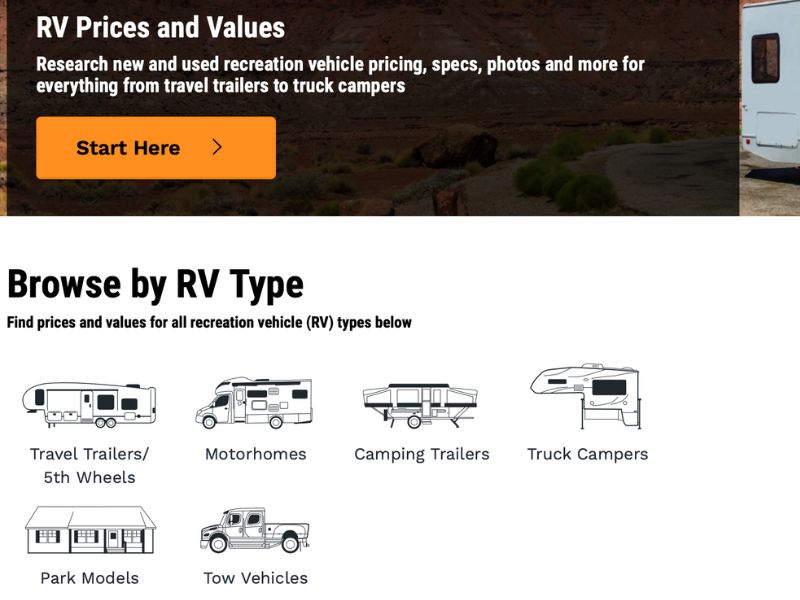
If you are familiar with the Kelley Blue Book website, you will find the NADA RV Pricing Guide to be very similar.
To start, go to the website and choose the type of RV or travel trailer you own or are looking to buy. You can use the drop-down menus to select the manufacturer, models, years, length, and add-on options. If you have a motorized RV, you can also enter the mileage, which is extremely useful for determining the value of the rig. Once you have narrowed down your rig, you will enter your zip code to see up-to-date pricing for your region.
Keep in mind that pricing can vary tremendously from one region to the next. Even the time of year can have an impact on the estimated value of the RV!
In addition to an estimated value, the NADA website will also show you the list price (original MSRP) for the RV along with the average prices found online today.
Most of the pricing is up to date, but if you are looking at a much older RV, you may find only estimates or the site may refer you back to the manufacturer’s website for more information.
The information from the NADA website is a great place to start when valuing your RV for sale or searching for a used RV to purchase.
2. RVTrader Price Check
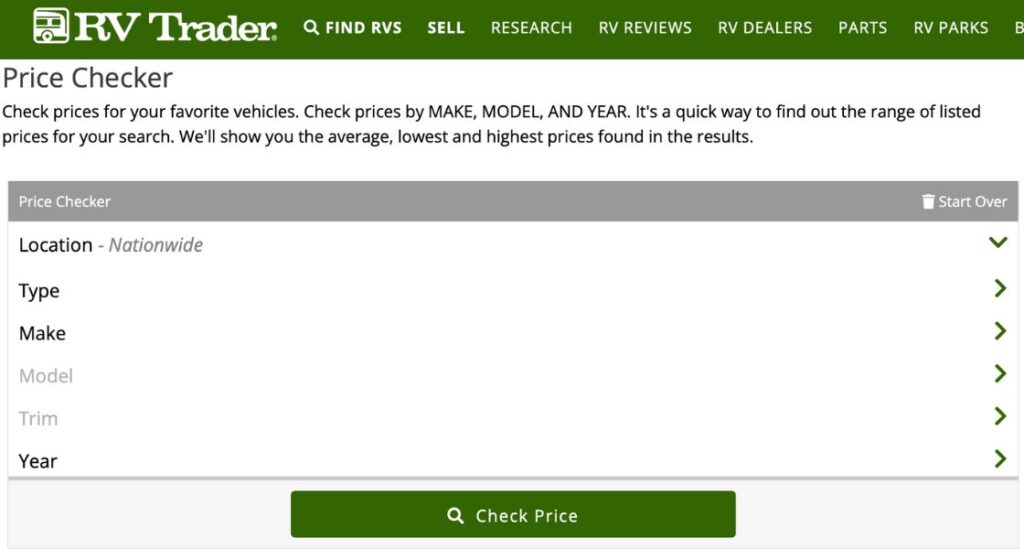
RVTrader is one of the leading websites for folks looking to buy or sell a used RV. Whether or not you choose to make a sale or purchase through the website, it can be a useful tool for determining the value of the RV you are looking to sell or purchase.
To get an estimated value on RVTrader, you can enter the RV make and model into the search tool to see the current prices of similar RVs. RVTrader also offers a feature called RV Price Check that will give you an overall value of your RV. What we like about this feature is that it will provide you with three estimates for your RV: the highest value, lowest value, and average value. These estimates are helpful when deciding how to price your rig or figuring out a reasonable offer on an RV you are trying to purchase.
Keep in mind that the RVTrader Price Checker provides a general value for your RV, and is not as specific as the NADA value. However, it is an excellent resource, and checking out both of these websites together will give you an excellent starting point for determining how to price or bid on your RV.
3. RVchex Reports
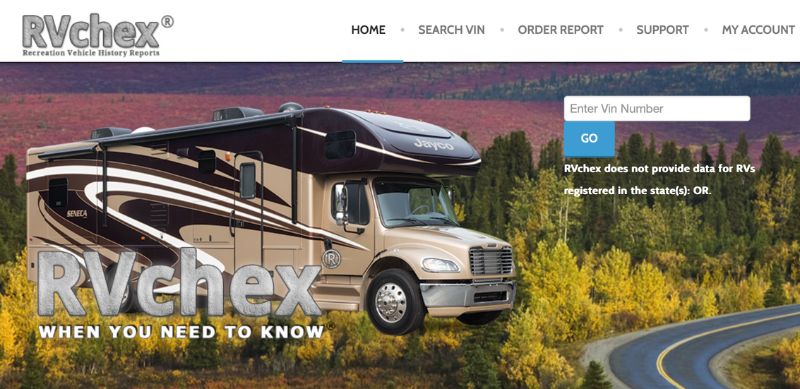
An additional resource that is helpful when estimating the value of a used RV is the RVchex Report. This report is similar to a Carfax report in that it tells you the vehicle’s history along with any reported accidents, damage, or repairs. This information is gathered through a search of the RV VIN number, so it is necessary to have that information on hand.
We have found the RVchex Report to be most helpful when purchasing a specific used RV, but it can also be useful when pricing an RV, particularly if you are not the first owner.
One other point to note is that this service is only available for motorized RVs. There is not a similar product on the market for travel trailers and fifth wheels at this time.
There is a charge for an RVchex Report, but we think it is a worthwhile investment, particularly if you are considering purchasing a used RV.
What Affects an RVs Value?
Much like a vehicle, many factors can impact the value of an RV. The most significant variables are the make, model, and year of the RV. In general, the newer the RV is, the higher the price you can expect to sell it for. Older RVs can be sold or purchased for much less.
The exception to this rule is certain popular brands of RVs, such as Airstreams. Airstreams tend to hold their value, and you can expect to receive top dollar if you are selling an older model Airstream in good condition. Likewise, if you plan to purchase an Airstream, the year may not make as much of a difference in the purchase price as the model and condition.
If your RV is drivable, the condition of the engine and the RVs mileage is extremely important. Low mileage is preferred to high mileage. Buyers will want to know that everything related to the operation of the RV is in working order.
The condition of the interior of the rig is another significant factor in the value of the RV. RVs in overall great condition inside will be worth more than those with interior damage. The layout of the RV impacts the price as well. Some layouts are more desirable and may fetch a higher price than other RVs of similar size with less desirable layouts.
In general, larger RVs tend to sell for more than smaller RVs. Some exceptions to this are popular teardrop models or smaller RVs in excellent condition with special features.
Additional Factors that Affect Your RV’s Value

If you are selling any additional items along with the RV, that can impact the value as well. Awnings, generators, solar panels, upgraded finishes, and more can affect the listing and purchase price. Likewise, if you are looking to buy an RV and the buyer is offering extra items, you can expect to pay a bit more. Of course, you can always make an offer that does not include these items. However, they may be useful, especially if you are new to RVing.
Other variables that can impact the value of an RV are the time of year and economic conditions. In general, you can expect to sell an RV for more (or pay more if you are a buyer) in the late winter and early spring. During this time of year, people are preparing for spring and summer travel, and RVers may be looking to upgrade their rigs, which increases demand.
If you are selling an RV, think about whether it would be better to market your RV to families or snowbirds/retirees. If your rig is desirable to “snowbirds,” retirees who winter in the southern United States and Mexico, you may want to try selling your RV in the late summer or early fall. Your model and floor plan will impact the type of buyer that you choose to target when selling your RV.
Do Economic Conditions Affect RV Values?
Finally, economic conditions at the time that you are trying to sell or buy an RV can dramatically impact the price. During times of recession, many people may be trying to sell their RVs to free up cash, making it an excellent time to buy. If you are a seller, having to sell your RV during tough economic times will usually mean agreeing to a much lower price.
When the economy is doing well, people often buy more luxury items, such as RVs. A strong economy can increase the demand for RVs, which will also increase its sale price. RV sellers will do well selling with a strong economy while the buyer can expect to pay a bit more.
The bottom line is that your RV is worth whatever someone is willing to pay for it. The amount of interest you receive in your RV when you list it for sale will also be a good indicator as to whether or not you priced it right.
How to Determine the Fair Market Value of an RV
Once you have determined a general price range for the RV you are selling or purchasing, it is time to dig into current pricing and values.
1️⃣ Compare Dealership Websites
Dealership websites are an excellent place to begin when determining a reasonable sale price or purchase price for an RV. If you are trying to sell a used RV, check out what that same RV would cost brand new. If your RV is several years old, you are not going to be able to ask anywhere close to the price of a new model.
2️⃣ Compare RV Classifieds
RV classifieds are an excellent resource for seeing what is on the market. If you are selling an RV, pay close attention to similar RVs for sale in your area. If there are numerous similar RVs for sale in your area, you will likely face competition from other sellers and may have to settle on a lower sale price.
Likewise, if you are looking to purchase an RV, you will want to determine how many RVs meeting your criteria can be found in your location. Searching for an RV in a more remote area can mean a better price for you. However, you will need to drive to the location to check out the rig and pick it up, so consider how much time (and gas money) you will have to spend to purchase an RV farther from your home.
3️⃣ Ask Your Bank How They Determine the Value of an RV
If you plan to finance your RV purchase, checking in with your bank before shopping is very important. Some banks may not be willing to finance a used RV purchase, or they may have set criteria for financing this type of purchase.
Finding out the terms and conditions of the bank in advance will save you time and possible headaches down the road. It can also be useful in helping you come up with a target budget and purchase price on the RVs you are considering.
How Much Does an RV Depreciate?
It is important to remember that no matter how well you care for your RV, RVs always depreciate. Unless you have a highly sought-after custom Airstream, for example, your RV will never be worth what you paid for it when you purchased it.
The value of an RV declines dramatically as soon as you purchase it, just like a car. For sellers, you need to remember that you will not be able to sell your RV for anything near the purchase price, no matter its condition. For buyers, this is good news! Even an RV only a year or two old should sell for much less than a brand-new RV.
While there is no exact science to determining how much or how quickly an RV will depreciate, many experts agree that an RV loses at least 20% of its value as soon as it is purchased. From there, the depreciation does slow down, but it doesn’t stop. An RV that is around five years old has likely lost about 35% of its value.
Again, the actual depreciation of your rig depends on many factors. An RV that is in excellent condition with low mileage will always be worth more than one that is in poor shape with high mileage.
How Do I Determine the Trade-In Value of an RV?
If you are planning to sell your RV and upgrade to a newer or larger model, trading in your RV may seem like a good option. It is important to keep in mind that most sellers lose money when trading in an RV compared with selling it on their own.
The newer your RV, the harder it will be for you to get a reasonable price for it, whether you are selling it or trading it in. Depreciation makes it challenging to sell or trade in models that are only a few years old.
Most dealers are not willing to pay anywhere near NADA value for your rig, no matter how good of condition it may be in. This process penalizes folks who have kept their RVs in good working order, as most dealers are not going to pay you more for an RV in excellent condition.
If your RV is in fair condition, trading it in may be a better option for you than making the repairs that would likely be necessary to sell it to a private buyer. While still not a great deal, it would save you the time and money that it would surely cost for you to get your RV in a saleable condition.
The bottom line is that you can expect to get less for your RV by trading it in than selling it yourself. The only advantage here is that you will not have to deal with the hassle of fixing up your RV, listing it, and meeting with potential buyers. If it is worth it to you to avoid this time and expense, then trading in your RV may be a good option.

Should You Buy A New Or Used RV?
One of the first decisions to make when buying an RV is whether to buy a new or used one. Each option has pros and cons, so carefully considering your needs and budget is essential.
After all, who doesn’t love that “new car smell” feeling? Plus, you’ll know exactly what you’re getting with a new RV.
There won’t be any surprises in terms of wear and tear or previous ownership. Most new RVs come with manufacturer warranties, giving you peace of mind if anything goes wrong.
However, new RVs also come with a hefty price tag. The average cost can range from $25,000 to $100,000 or more.
If you have a large budget and plan on using your RV frequently, there may be more financially practical options than buying a new one.
Pros:
- Warranty coverage: New RVs include manufacturer warranties, covering any unexpected repairs or issues.
- Customization options: You can customize your new RV to your liking, from the interior design to specific features, making it unique and tailored to your needs.
- Updated technology and amenities: New RVs often come equipped with the latest technology, making your travels more comfortable and convenient.
Cons:
- Higher cost: New RVs may not be workable for those on a tight budget or who plan on using their RV sparingly because of their higher price tag than used ones.
- Depreciation: Like any new vehicle, an RV will depreciate when it leaves the lot. If you decide to sell in the future, you may not get back the total amount you paid for it.
- Potential mechanical issues: Even with warranties, unexpected mechanical problems can arise with new RVs, which can be both a hassle and potentially expensive.
Buying a used RV can save you thousands of dollars. You’ll often find great deals on used RVs that are only a few years old and still in excellent condition.
Plus, if you’re handy and willing to do some repairs or updates yourself, you can save even more money by purchasing an older model.
Another advantage of buying used is finding a wider variety of RVs. While manufacturers release new models each year, the options for used RVs are endless.
You can find a specific make and model that isn’t available in newer versions.
However, there are also some drawbacks when purchasing a used RV. The biggest concern is the condition of the vehicle.
Unlike buying a new one, a used RV does not have a guarantee or warranty. Inspecting any potential purchases thoroughly and having a trusted mechanic look before making a final decision is essential.
Financing options for used RVs may be more limited than new ones. If you’re planning on financing your purchase, it’s important to research different lenders and their requirements for used RV loans.
Another factor to consider is the potential for hidden costs. Additional repairs or maintenance may be necessary depending on the RV’s age and condition. Budgeting for these potential expenses is essential for a more accurate understanding of the total cost of owning a used RV.
Pros:
- Affordability: Used RVs are often more budget-friendly than new ones.
- More Features: Purchasing a used RV can provide access to additional features and amenities at a lower cost.
- DIY Opportunities: Those who enjoy do-it-yourself projects can save money by handling repairs on their used RVs.
Cons:
- Potential Wear and Tear: A used RV has a higher chance of encountering wear and tear, leading to expensive repairs.
- Limited Warranties: Used RVs may come with limited or no warranties, leaving owners responsible for any repairs or replacements.
- Unknown History: It is essential to thoroughly research a used RV’s history before purchasing it to ensure you know of any potential issues.
When deciding whether to buy a new or used RV, it’s essential to weigh the pros and cons and determine what works best for your lifestyle and budget.
If you value having the latest technology and customization options, a new RV may be the right choice.
However, if the budget is a top priority and you are willing to make some repairs or updates yourself, a used RV could save you money in the long run.
Do RV Prices Vary By State?
Yes, RV prices vary significantly by state because of supply and demand, taxes, and local market conditions.
For example, states with a high population of RV owners may have higher prices because of the demand for recreational vehicles. Some states with lower populations or fewer camping opportunities may have lower RV prices.
Researching and comparing RV prices in the specific areas you are interested in purchasing is crucial. Traveling to another state could save you thousands of dollars on your dream RV.
What States Have The Highest RV Prices?
States with robust economies, like California, Florida, Texas, and New York, typically experience higher demand for RVs. This leads to dealers in these regions being able to charge higher prices for their vehicles. People are often willing to pay more when there is a high demand.
Popular vacation destinations like Florida and California see many seasonal RV rentals, which drive up the cost of an RV in these areas.
It’s also worth noting that the cost of living in certain areas can significantly affect the price of an RV. The West Coast and Northeast have higher living costs than other parts of the country, which can translate to higher RV prices.
Another factor that affects RV prices is state taxes and registration/licensing fees. These can vary from state to state and significantly increase the overall cost.
For example, California has some of the highest registration fees in the country, while states like Montana have no sales tax on vehicles.
How Do I Sell My Used RV?
If you are ready to sell your current RV, there are steps that you can take to ensure that the process will be as smooth as possible. These steps will also give you a better chance of receiving the highest possible price for your used RV.
1. Price Your RV to Sell
The first step in selling your RV is to price it right. If you have used the NADA website and other tools provided in this article, you should have a good idea of what your rig is worth. Remember to take your love for your RV out of the equation. Go by the values listed and consider pricing your RV even a bit lower than its listed value to make a sale faster.
2. Decide Where and How You Will Sell Your RV
The next step in selling your used RV is deciding where and when you plan to sell it. You can sell your RV privately, sell it to an RV dealership, or trade it in. If you decide to trade in your RV or sell it to a dealership, you will most likely receive a much lower price for your RV. You also need to make sure that the dealership is interested in your particular RV, as some dealers only sell specific brands and models.
On the plus side, selling to a dealership is usually the fastest and easiest way to sell your RV. If you need to sell your RV quickly, consider selling directly to a dealer.
If you decide to sell your RV privately, you will most likely make more money on the sale. However, it will probably take more time than selling to a dealership. Consider whether you want to sell your RV online or locally. If you decide to sell your RV locally, you need to find a great place to park it. If you live along a busy street, your driveway may be an excellent place to display your camper. Another good option is a local campground. Wherever you decide to park your RV, make sure the “for sale” sign is easy to see and read.
Selling online allows you to reach a larger audience, which is always a good idea when you are trying to make a sale. There are many great websites where you can list your RV for sale, such as RV Trader or RVT.com. You could also use a site such as eBay, Craigslist, or Facebook Marketplace.
Word of Mouth Helps
No matter where you decide to sell your RV, be sure to let your friends and family know that it is for sale. Word of mouth is a great way to make a sale, as you never know who may be in the market for an RV! Be sure to share the information on your social media accounts as well.
3. Choose the Right Time of Year to Sell
Remember that the time of year can make a big difference when it comes to selling your RV. The beginning of the year and spring are when people are getting excited about summer travel and may be looking to buy an RV. During the summer, most people are out enjoying themselves, which makes it challenging to make a sale.
The worst time of year to try to sell your RV is the fall season or around the holidays. While you may have some luck selling in the fall if you are marketing your RV to snowbirds, it is not usually a time when people are looking for RVs. Be sure to avoid listing your RV near the holiday season as well. The holiday season is the slowest time of year for RV sales, and your rig will likely sit on the market much longer.
4. Deal With Any Issues in Your RV
Hopefully, you have kept your rig in good condition, which will make this step much more manageable. No matter what condition your RV is in now is the time to give it a thorough inspection and correct any issues.
Potential buyers are going to be looking out for any sign of a problem, particularly issues with the engine or water damage of any kind. Check for everything from dents to mold and water damage and fix these issues. Most buyers will walk away from a sale if they see problems of this kind. While others may be willing to negotiate, you can expect to drop your price tremendously if there are noticeable issues in your RV.
5. Thoroughly Clean and Stage Your RV
Now is the time to take all of your personal belongings out of your RV. No one wants to see your clothes in the closets when they are considering a purchase. Remove all personal items and complete a deep clean of your rig. You may want to hire a professional to clean any carpets if there is an odor to your camper. If you come across anything that is broken in your RV, make sure that you repair it.
Once all of your items have been removed, and the RV is clean, you may want to bring in a few small decorative items to make your RV look inviting. Placemats on the table neatly made beds, and maybe even some flowers are all little touches that can make your RV shine.
6. Write a Great Advertisement and Include Pictures
Whether you choose to sell your RV locally or online, you will want to create a strong advertisement. If you decide to sell locally, you can post your ad in local businesses. If you choose to sell online, a good ad is even more critical.
The text of your ad should cover the basics about your RV and answer common questions buyers will have. Details like mileage, repairs that have been made, the age of the tires, and the features of the RV are all important to include in your ad.
Be sure, to be honest in your advertisement. Minor issues are not going to scare away buyers, and they will likely discover the problems for themselves when they come to view your RV.
When it comes to pictures, you want a lot! Try to have at least 12-15 images of your RV. You will need photos from both inside and outside of your RV. Also, be sure to take pictures taken from different vantage points. Photos are essential to get potential buyers to decide to come and see your RV in person.
7. Get Your Paperwork in Order
If you have documents from the purchase of your RV and any repairs and maintenance you have completed, gather them together for the potential buyers.
Buyers love to see proof that the RV has been well maintained, and paperwork provides that evidence. If you have any manuals for your RV or appliances, include those documents as well.
Next, make sure you have all the required paperwork to complete the sale. You will need to complete a bill of sale and title transfer and file them with your state Department of Motor Vehicles. You may also need a notary present to witness the transaction. Research the requirements for your state so that you will not have any surprises.
Finally, if you are selling your RV privately, make sure to require the buyer to pay you with cash, a cashier’s check, or a money order. It is never wise to accept a check or any other form of payment for a transaction of this size.
8. Typing No – No’s
Whenever you are writing an online advertisement or perhaps responding to a potential RV buyer via email, please do not use all capital letters. It is like you are yelling at the person. It will probably turn people off.
So, remember do not use your CAPS LOCK.

Can I Rent My RV Instead of Selling It or Trading It In?
Yes, you can rent your RV instead of selling it or trading it to buy an RV. Especially if you don’t need the money from the sale of your RV as the down payment on your new RV.
There are many reasons that renting your RV may make more sense than selling it. Here are just a few.
✅ Your RV has depreciated so much that its value is very low
If your RV has depreciated a lot then selling it may not make sense. If you can rent it and make more money than you would if you sold it then maybe you should consider renting it out? You can make up to $20,000 a year, or more in some cases, renting your RV.
✅ You can make enough money renting your RV to cover all the monthly expenses of the new RV
Even the least expensive popup campers rent for $50 a day so let’s say you can rent your RV and make $500 a week. and you rent it for 20 weeks a year. That’s $10,000!
I would imagine that $10,000 would cover the monthly RV and insurance payments for your new RV. Let’s say your new RV payment is $300 a month and insurance is $50 a month. That’s $350 a month for 12 months which is $4,200 a year. That means you would pocket $5,800 a year renting out your RV!
✅ It’s safer and easier than ever to list and rent your RV
With companies like RVshare and Outdoorsy, it is easier than ever to list your RV for rent and rent out your RV. These companies handle all of the paperwork, insurance, roadside assistance, and security deposits. It really couldn’t be any easier. In fact, you can even use Outdoorsy’s listing calculator to see how much money you can make renting out your RV.
Just enter the type of RV you have and it will give you an estimated range of how much rent you can expect per week. To get a more specific estimate you could lookup similar size RVs on their site and see how much they are renting for.
I ran my own type of RV and here are the results I got for my Class C RV if I decide to rent it out.
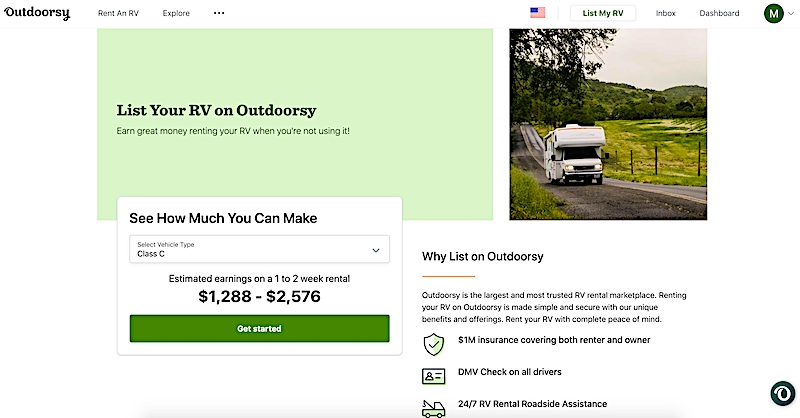
Decide Who You Are Selling To
Some sellers forget to think about WHO they are selling to. Think about it this way – would you rather sell to an RV dealership or would you rather have a sign in the yard that says “For Sale By Owner”? This is an important question to answer.
Of course, there is the online option to sell your used RV, but sometimes you get a lot of email inquiries and not anyone actually buying. Online marketplaces such as Craigslist, Facebook Marketplace, RV Trader, and more are all options.
Pros and Cons of Selling to an RV Dealer
Every RV dealership is going to try to buy your RV for a song because they have to make money too. And that is okay because they are your fast alternative to trying to sell it yourself. However, do not let professional RV dealers pressure you into giving away your RV for a fraction of its value either!
There are a lot of ways to find out what you can sell your RV for. Many websites will give you a free vehicle valuation, market analysis, and information. Honestly, the best way to sell your RV fast and for its proper value is to know as much as you can.
Try Selling Your RV While Camping!
Sounds crazy? Well maybe, but maybe not. Think about it – where is there a better place to talk to potential RV buyers than when you are at a campsite?
How many times have you walked around the campground you are staying at and looked at other people’s camper trailers? Your answer is probably “often”. If you have a “For Sale” sign up in the window then you just might strike up a conversation with a potential buyer for your used RV.
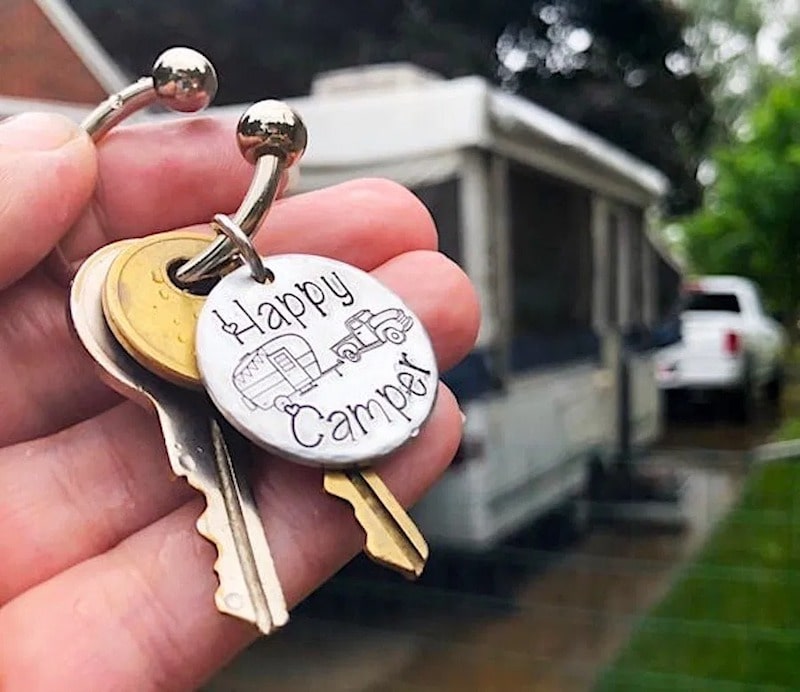
Consignment versus Private Sale
Whatever your reason for wanting to sell, considering the pros and cons of consignment versus private sale may be worth researching. Let’s look at the differences between the two below:
What Is RV Consignment?
An RV consignment is when another party, in most cases it is a dealer, tries to find a buyer for your used camper trailer. In the meantime, you still have full ownership of your RV as well as any financial obligation if you have a loan.
The biggest negative to RV consignment is you have to pay a set commission to the dealership. Of course, the flip side of that is you don’t have to advertise, market, find, or deal with the RV buyer.
What Is A Private Sale?
This is when you, the RV owner, do all of the work. You will be advertising, marketing, cleaning, promoting, and finalizing the sale of your used camper trailer.
The biggest advantage to a private sale of your used RV is that you will not pay any commissions. If money is an issue, then selling your used camper trailer yourself will ultimately save you money but likely will take you longer to sell it.
How Much Does a Used RV Cost?
The cost of a good, used RV varies by the model and age of the RV. Once you have examined the price range of the make and model RV you are considering, it is time to consider its condition and any extras that may come with the purchase.
An RV that doesn’t need much, or any, work will be worth more than an RV that needs some touch-ups. If the seller is planning to sell the RV with upgrades and additional features, it will be worth more as well.
Some upgrades that will increase the value and price of an RV include new air conditioning, upgraded finishes, satellite TV, solar panels, and new appliances.
Conclusion
Whether you are selling buying or even renting out your RV we hope this article provides lots of helpful info so you have the tools and the know-how to make your best deal.

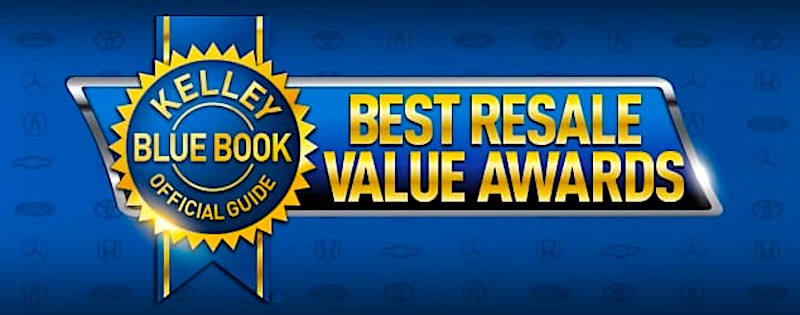

Very informative. Thanks. We aren’t RV owners yet but may be sometime in the near future.